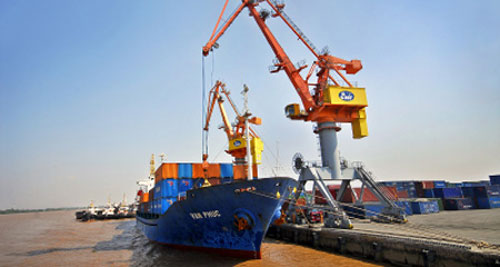VietNamNet Bridge – In a conversation with Dai Doan Ket (Great National Unity) newspaper, National Assembly Deputy Cao Si Kiem pointed out some of the constraints hindering the country's development.
|
|

|
The recent government economic report indicates that progress has been recorded when it comes to the ongoing national economic restructuring. However, it also mentions some of the challenges. In your opinion, what are these challenges?
The economic restructuring process has already taken place in State owned enterprises (SOEs) and the banking sector. However, these institutions still face challenges, particularly the lack of legal documents concerning capital resources, capital withdrawal, bad debts and redundant employees.
If we don't implement policies to help the SOEs solve problems that they are facing and give guidance to the general public, that situation might get worse.
In my opinion, transparency and proper communication are crucial. For example, what's happening in the East Sea has impacted our economy significantly, particularly when it comes to the price of gold and the US dollar. The State Bank of Viet Nam reacted very quickly by declaring that the bank was ready to intervene to stabilise the market if the situation got worse. The bank's quick response eased people's anxiety and boosted their confidence in the Party and government policy.
What are your comments on the ongoing equitisation process for SOEs, as well as the national economic restructuring in general?
The restructuring of State commercial banks and related issues, including bad debt settlement and capital withdrawal, have been going fairly well.
The establishment of the Viet Nam Asset Management Company (VAMC) did a lot to resolve the bad debt problem for commercial banks. But the next question is: How can the VAMC sell these bad debts and get the money to pay back the commercial banks? In the end, the goal is to create capital flow that can be used for business production, the driving force for national economic growth.
As I mentioned already, Viet Nam is facing some institutional challenges, particularly a lack of capital to address collateral asset and bad debt problems and the issuance of VND30 trillion (US$14.2 billion) for the affordable housing package.
I'm confident that if bad debts are properly managed and credit quality is improved, our national economic restructuring process will achieve its goals.
Many people have argued that it's necessary to give preference to SOEs. But what we urgently need now is policy transparency and efficient public services. What's your position on this?
Giving "preference" to State-owned enterprises should be interpreted as empowering them with autonomy, not giving them preferential rights in the use of State capital or administrative decisions. We should follow the principles of the market economy to enable enterprises to develop sustainably.
At the ongoing National Assembly meeting, the deputies are discussing amendments to a number of laws, including the Law on Enterprises, the Law on Public Investment and the Law on Management of State Capital. Do you think that these revised laws will change anything for enterprises?
The key objective of revising these laws is to help enterprises solve the difficulties that arise while operating in a market economy and trying to achieve international integration. But how these laws are implemented depends on the guiding documents issued by the government.
Trading with China is very important in our national economy. If relations with China sour further, do you think it will affect our economy?
China is Viet Nam's major import-export market, particularly for equipment, agro-fishery products and IT equipment. If the situation gets worse, of course we need to adjust our policies. As we all know, any adjustments require time and money. However, if we are proactive and join under the leadership of the Party and Government, we can overcome such challenges.
Source: VNS